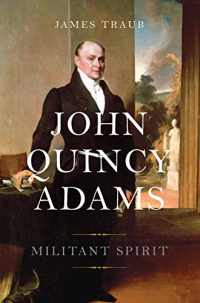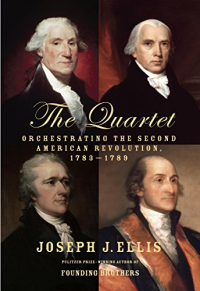
Specifically I read The Quartet, by Joseph Ellis, about the four key figures who drove the creation and adoption of our Constitution, and John Quincy Adams: Militant Spirit by James Traub.
What I found was the pre-history of my own profession, journalism, and the press.
In the late 18th century, and early 19th century, journalists were simply the owners of printing presses. They were little more than local bloggers, and their opinions were often for sale to the highest bidder. There was no one doing “objective” news. People understood broad events like the French Revolution, but what they thought of those events was driven by money, specifically that money put into driving opinion by printing press owners and by politicians controlling them.
Over the last 20 years, American journalism has moved strongly back toward that model. That gatekeeper function, the pride of The New York Times and even CNN in the 20th century, turns out to have been a mere product of successful business models, which aggregated an educated readership and then sold access to that market, for a premium price, to advertisers.
I asked, 20 years ago, how hungry publishers were. I encouraged them to take the opportunity the Internet offered to drive their readers further down the sales funnel, not just selling billboards along the roadside by engaging in real commerce.

In order to attract a mass market, and to grow that mass market fast enough to stay in place financially the new sites first engaged in crude aggregation. They captured what people were saying about the news, not just the news, and put kids behind keyboards to create clickbait headlines and drive discussion that often had nothing to do with the content of the underlying story.
Common Sense and The Federalist Papers were little more than paid blog posts. Printers sold copies, which got enormous pass-along readership, so it was the writing skill and, eventually, the reputation of the anonymous authors that drove these ideas forward.
During John Quincy Adams’ time, local printers became local publishers, and in order to keep printing they either sought to drive or, in course, to be driven by the financial interests of political movements. This is how Adams lost to Andrew Jackson. Jackson’s people bought access to the press, Adams and allies like Henry Clay could not compete, and Jackson simply out-shouted the “National Republicans,” as Adams’ movement was called until Clay’s term, “Whigs,” gained common currency.
Whig, it turns out, was a piece of political branding meant to identify Jacksonian Democrats as “Tories,” the Whigs being England’s more liberal party and the Tories the common name for conservatives. George Lakoff, take note.
Jacksonian Democracy was wholly reactionary. It condemned the concept of banking, and Jackson’s own white whale was the Bank of the United States. (Had he not lost to Adams in 1824 he wouldn’t have lasted long enough to kill it.) Jackson rejected the whole concept of infrastructure, what Adams called “internal improvements.” Jacksonian Democrats even sought to reject the gift of James Smithson – it was Adams’ agitation in the House of Representatives that finally got it accepted, resulting in the Smithsonian Institution.

The reactionary nature of the Trump movement, its drive to create its own ideological press, and then use that press to crush opponents, is endorsed by early American history. But it led this country down a very dark path, one that committed genocide against the Indians, that sought to enforce slavery against the whole country, and whose “Manifest Destiny” was nothing more than an excuse to create what Hitler later called “Lebensraum.”
The raw racism of the Jackson era was only threatened, and overthrown, by the rise of effective journalism business models in the 1850s, through the mass publication of books like Uncle Tom’s Cabin and the growth of papers that could hire writers like Frederick Law Olmsted at The New York Times.
America doesn’t have that long to wait for reform this time. We can’t afford another Jacksonian era, with rich racists raping the land in the name of private profit and national pride, and with government having no role in the economy or peoples’ lives. That’s where the money of Robert Mercer wants to lead us, and its control of an alternative-reality media is leading us there.
Do Americans have the strength to resist? Because journalism won’t save us from it. It’s up to political organizations, and the people themselves, to determine the fate of the nation.
We’re out of it.










